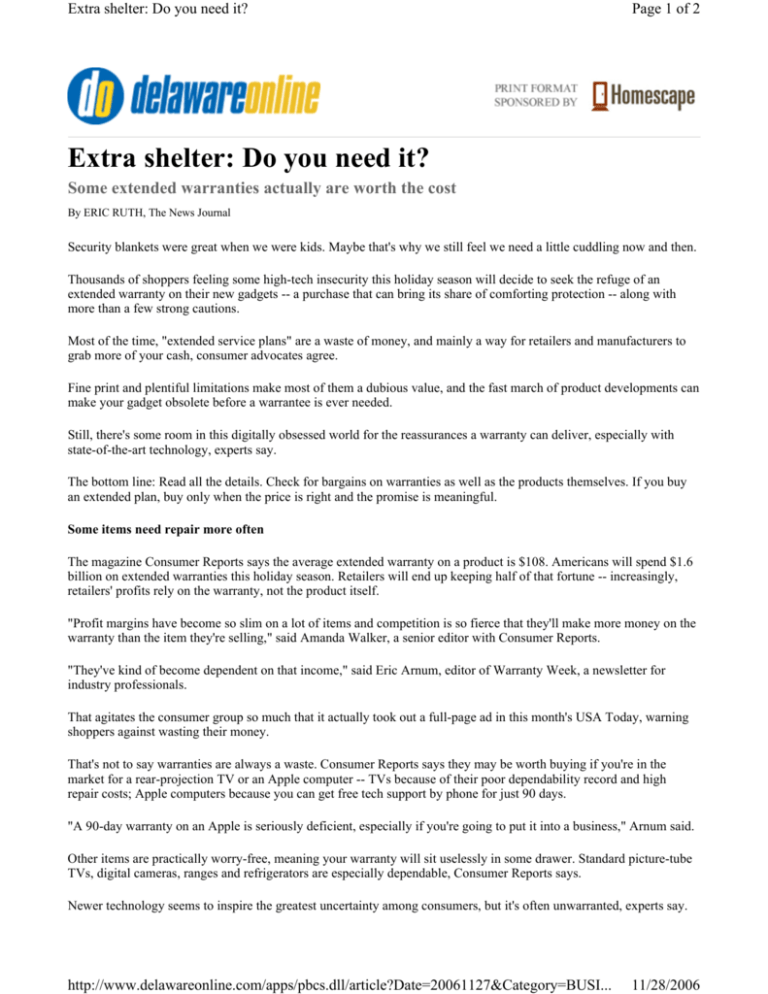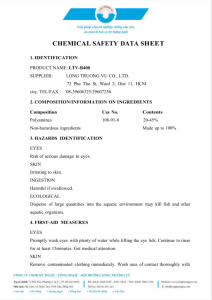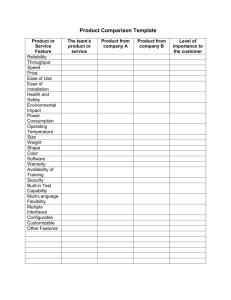article - University at Buffalo
advertisement

Extra shelter: Do you need it? Page 1 of 2 Extra shelter: Do you need it? Some extended warranties actually are worth the cost By ERIC RUTH, The News Journal Security blankets were great when we were kids. Maybe that's why we still feel we need a little cuddling now and then. Thousands of shoppers feeling some high-tech insecurity this holiday season will decide to seek the refuge of an extended warranty on their new gadgets -- a purchase that can bring its share of comforting protection -- along with more than a few strong cautions. Most of the time, "extended service plans" are a waste of money, and mainly a way for retailers and manufacturers to grab more of your cash, consumer advocates agree. Fine print and plentiful limitations make most of them a dubious value, and the fast march of product developments can make your gadget obsolete before a warrantee is ever needed. Still, there's some room in this digitally obsessed world for the reassurances a warranty can deliver, especially with state-of-the-art technology, experts say. The bottom line: Read all the details. Check for bargains on warranties as well as the products themselves. If you buy an extended plan, buy only when the price is right and the promise is meaningful. Some items need repair more often The magazine Consumer Reports says the average extended warranty on a product is $108. Americans will spend $1.6 billion on extended warranties this holiday season. Retailers will end up keeping half of that fortune -- increasingly, retailers' profits rely on the warranty, not the product itself. "Profit margins have become so slim on a lot of items and competition is so fierce that they'll make more money on the warranty than the item they're selling," said Amanda Walker, a senior editor with Consumer Reports. "They've kind of become dependent on that income," said Eric Arnum, editor of Warranty Week, a newsletter for industry professionals. That agitates the consumer group so much that it actually took out a full-page ad in this month's USA Today, warning shoppers against wasting their money. That's not to say warranties are always a waste. Consumer Reports says they may be worth buying if you're in the market for a rear-projection TV or an Apple computer -- TVs because of their poor dependability record and high repair costs; Apple computers because you can get free tech support by phone for just 90 days. "A 90-day warranty on an Apple is seriously deficient, especially if you're going to put it into a business," Arnum said. Other items are practically worry-free, meaning your warranty will sit uselessly in some drawer. Standard picture-tube TVs, digital cameras, ranges and refrigerators are especially dependable, Consumer Reports says. Newer technology seems to inspire the greatest uncertainty among consumers, but it's often unwarranted, experts say. http://www.delawareonline.com/apps/pbcs.dll/article?Date=20061127&Category=BUSI... 11/28/2006 Extra shelter: Do you need it? Page 2 of 2 Consumer Reports found that most flat-panel TVs are reliable for more than two years, and cautions that repairs could end up costing less than the warranty. Personal computers, which often come with a one-year warranty, are also more cost-effective to repair than to cover with a warranty. Consumer Reports found some other items -- laptops, most notably -- do break down relatively often, but usually not until after the extended plan has expired. A wide disparity of prices Extended warranties have become more popular in part because technology has left us feeling incapable of fixing things now, experts say. "It's new, it's scary, it's perceived as being vulnerable," Arnum said. But we also don't spend much time bothering to learn what warranties actually promise, and how they work. Consumers don't generally realize that the warranty product is essentially an insurance policy, and fulfilling it rests with the underwriting company, not the retailer or manufacturer. That can create complications, and spoil some expectations, experts say. Original "free" warranties that come with the purchase are also unpredictable commodities. Even as the base warranty period for some products rises, the coverage for others is shrinking, Arnum said. The far-ranging market of warranty providers also creates a wide disparity in prices for what's essentially the same coverage. Warranty Week found a warranty for a Panasonic plasma TV priced at $79 at one retailer and $500 at another. "Very often the extended warranty can cost a significant fraction of the cost of the original good," said Lewis Mandell, professor of finance and managerial economics with the University of Buffalo. While Arnum agrees with much of the sentiment in Consumer Reports' warnings, he believes that warranties shouldn't be rejected out of hand, so long as shoppers can find a deal on them. "There is a price at which an extended warranty makes sense," he said. "Likewise, there is a price at which the extended warranty does not make sense." That price-checking should include a close look at the details. Some warranties pay for parts, but limit labor coverage to a far shorter period. Others cover nearly every part for the extended period -- excluding the one that's most likely to break. "You think you have a good warranty, until you need it repaired," Arnum said. Copyright © 2006, The News Journal. Use of this site signifies your agreement to the Terms of Service and Privacy Policy (updated 10/3/2005) Use of this site signifies your agreement to the Terms of Service and Privacy Policy (updated 10/3/2005) http://www.delawareonline.com/apps/pbcs.dll/article?Date=20061127&Category=BUSI... 11/28/2006






